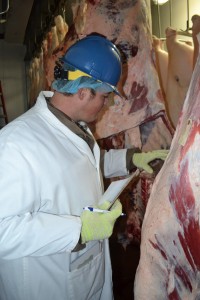KDA initiates beef grading program
Posted on May 4, 2015Not all cows are created equal. Considering the variability of beef carcasses, the grade of a cut sold at retail can be important to some consumers when it comes to selecting what’s for dinner.

A new service being provided by the Kentucky Department of Agriculture helps both growers and buyers by providing a standardized assessment of beef being harvested and sold in the Commonwealth.
With funding from the Kentucky Agricultural Development Board, the Department has established a groundbreaking state meat grading program with federally trained graders to give Kentucky producers an added market advantage.
Todd Henning and Donovan Pigg are United States Department of Agriculture-certified carcass graders who work for the Kentucky Department of Agriculture providing services to Kentucky Proud members. The two usually work independently, Todd covering the Western section of the Commonwealth while Donovan works in the East. They share duties in Central Kentucky.
It’s a new program wherein, at no cost, a producer can have his beef graded to provide a little edge when the product is direct marketed.
Under the Federal Meat Inspection Act, all meat sold in the U.S. is mandatorily inspected to assure its safety and integrity. After meat is inspected for wholesomeness, producers and processors may request that they have products voluntarily graded for quality by a certified Federal grader.
“We went to Michigan for two weeks training and certification at a USDA plant,” Donovan explained. “Through Kentucky Proud, we want to help the producers, processors and slaughter facilities that sell retail cuts.”
Donovan and Todd go to USDA certified and inspected facilities to examine carcasses and assess a grade of prime, choice, select or standard so that graded retail cuts may be sold.
According to the USDA, Beef is graded as whole carcasses in two ways:
- -quality grades - for tenderness, juiciness, and flavor; and
- -yield grades - for the amount of usable lean meat on the carcass.
Prime Grade has abundant marbling and is generally sold in restaurants and hotels. Prime roasts and steaks are excellent for dry-heat cooking (broiling, roasting, or grilling).
Choice Grade is high quality, but has less marbling than Prime. Choice roasts and steaks from the loin and rib will be very tender, juicy, and flavorful and are, like Prime, suited to dry-heat cooking.
Select Grade is very uniform in quality and normally leaner than the higher grades. It is fairly tender, but, because it has less marbling, it may lack some of the juiciness and flavor of the higher grades.
Standard and Commercial Grades are frequently sold as ungraded or as "store brand" meat.
Utility, Cutter, and Canner Grades are seldom, if ever, sold at retail but are used instead to make ground beef and processed products.
Yield grades range from "1" to "5" and indicate the amount of usable meat from a carcass. Yield grade 1 is the highest grade with the greatest ratio of lean to fat; yield grade 5 is the lowest yield ratio. Though yield grades are not something consumers normally see, they are most useful when purchasing a side or carcass of beef for the freezer.
Grading can also be an important production tool for growers looking to improve the retail cuts they sell. The graders want to be able to go to a farm and look at someone’s cattle before they’re killed and provide some ideas as to what it might take to get the carcass to a better grade.
“We don’t have to put a stamp on a cow to be beneficial,” Donovan notes. “We want to provide information to the producers as to what might make their product a little better, maybe just holding them and feeding them a little longer, whatever these calves need to grade a little better on the rail.”
With more emphasis being placed on locally sourced meats, having grades on their cuts might give producers a little added value and give the consumer the satisfaction of knowing the quality of their purchase.
To take advantage of the program, Contact: Donovan Pigg - (502) 573-0282 or email donovan.pigg@ky.gov
Tagged Post Topics Include: Carcass, Donovan Pigg, Federal Meat Inspection Act, Grading, KDA, Kentucky Agricultural Development Board, Todd Henning, UK, USDA
Comments